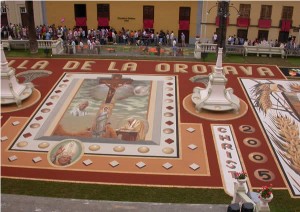
Finding Peace and Freedom
We cannot find peace if we are arguing with God in whatever form we perceive the sacred. The Divine Reality loves us without reservation. We cannot find happiness and peace in any other place. Even non-believers will only find peace in the Reality that has created the universe and encloses all of it within Itself. God has given everything in the universe love and freedom. God’s love is total. It encompasses everything that promotes our growth and transformation. We have been created for union with this sacred reality, so we learn and experience during all our lives ways to be like God: to be knowing, understanding, wise, discerning, reverent, courageous and in awe of the transcendent. Everything in the universe has degrees of freedom. The nature of everything determines the degrees of freedom. I cannot flap wings and fly. I cannot breathe under water just as I am. I will always be a middle child. But, there are many ways in which I can determine my course in life, work with limitations or with strengths.
As I live my life I have many possibilities before me. I also have a certain amount of freedom. If I believe in the reality of God, I see myself in a relationship with God, a God who is close or distant. All religious and spiritual traditions have concepts of the relationship of human powers and divine powers. These relationships involve change, improvement, decision, freedom, human failure, consequences and divine intervention. The theological terms often used for these phenomena are: conscience or consciousness, grace, nature, discernment, acts, harm or sin and moral good, and judgment or karma. If I am thinking about getting more money I have a number of reasons as to why I want more money, what I possibly want to do to get money, and what the pros and cons are with various options. I can look at the decision from many angles. I can line up my ideas and come up with what I think will work the best. I can talk to others or read various sources. I can also present this to God in prayer and say: “Please tell me what You see as best for me.”
This is not easy to do because most people feel that God does not think of my little side to things; God is only interested in the Bigger Picture and saints or martyrs. In fact, God is very interested in individuals. God as most Westerners conceive of God is a personal Reality who sees us fully and knows exactly what would make us happy. We are still not too sure about that because it sounds too mature for us. Attending to our health and saving money may sound difficult, so long term happiness planning may seem very hard. I am the first to say that buying something new sounds like fun. But, wanting to surrender to God as our source of wisdom and a guide is the only way to have peace. We are also very rational in the West and often think God is so intangible or un-provable as to be neither reliable nor a reality with which we can have a two-way communication.
Time for Centering
Taking time each day to practice centering in God for the direction of our day and our lives is necessary. There are many ways to do this: journaling, walking a labyrinth, and having a spiritual counseling session are ways to think and pray through where I am in my life, where I feel drawn, and what God sees in me that I might benefit from. Another way to have an experience of being counseled by God is the Ignatian Examen.
Very briefly, sit quietly and think of or imagine things you are truly grateful for. They can be big or small: Clean sheets, good food, your dog, ways you have been loved, accomplishments, a family member or friend, your house or job etc. Tell God what you are grateful for. See, if God has given you things you are grateful for: a rescue in life, money you needed, safety, a trip you took. Then think of the things in yourself or your life which you have chosen that have harmed you, undermined your well being, or side-tracked you. These can also be big or small: being resentful, feeling superior, or not being willing to do something new that you need to do. Ask God to help you with these fears or hurts that have held you away from Him. Lastly, ask God how you can spend the next part of your day or life doing what is best. You will get answers. You can surrender to what is best and see how much more peace-filled you are. I do this every day, sometimes more than once. I act on what I hear and I am much more at peace.
Image: Three Candles by Alice Birkin, public domain
Read More
 On March 13, the second anniversary of his papacy, Pope Francis announced a special year of prayer and other special activities to celebrate God’s unlimited mercy. The announcement was made as part of the Pope’s homily while he was presiding over a Lenten penance service. Divine mercy is one of the Pope’s major themes in his preaching and pastoral activity. The year will officially begin on the Feast of the Immaculate Conception (December 8, 2015) and end on the Feast of Christ the King (November 20, 2016). The Holy Year of Mercy also marks the 50th anniversary of the close of the Second Vatican Council. It will be marked by special ceremonies and liturgies. Since this Holy Year is outside the traditional 25 or 50 year interval for regular Holy Years it is called an Extraordinary Holy Year.
On March 13, the second anniversary of his papacy, Pope Francis announced a special year of prayer and other special activities to celebrate God’s unlimited mercy. The announcement was made as part of the Pope’s homily while he was presiding over a Lenten penance service. Divine mercy is one of the Pope’s major themes in his preaching and pastoral activity. The year will officially begin on the Feast of the Immaculate Conception (December 8, 2015) and end on the Feast of Christ the King (November 20, 2016). The Holy Year of Mercy also marks the 50th anniversary of the close of the Second Vatican Council. It will be marked by special ceremonies and liturgies. Since this Holy Year is outside the traditional 25 or 50 year interval for regular Holy Years it is called an Extraordinary Holy Year.




















